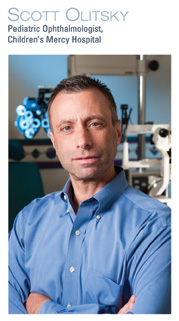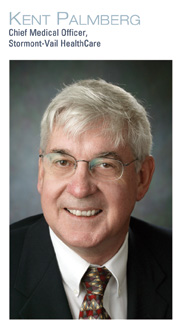
As much as pediatric ophthalmologist, Scott Olitsky is a detective. Correcting a child’s vision is a challenge often compounded by his patients’ inability to articulate what ails them. Sometimes, they can’t quite correctly describe what’s wrong with their vision; sometimes, they don’t even have a frame of reference to know what’s wrong. And sometimes, they’ve barely begun to talk. “You have to put pieces of the puzzle together because of their age and inability to tell you what’s actually happening,” says Olitzky.
That’s his challenge as chief of ophthalmology at Children’s Mercy Hospital, duties that compete for his time as a professor at the UMKC School of Medicine. Children’s Mercy came after Olitsky in 2002, bringing this native Philadelphian to the Midwest with immediate benefits for both. “I would have to say what I’ve found here exceeded what I expected, both with the hospital and the community,” Olitsky said. Drawn to the field by the experience of a family friend—“I knew he was happy doing what he did every day,” Olitsky says—he has found his own happiness, as well. “The patients are generally happy seeing you. The initial attraction is the ability to see people through all ages of life, plus you can practice medicine
and surgery in the same field.”
His wife of 23 years, Andrea, and three daughters provide additional grounding from home, as does time spent running marathons and climbing—he hopes to take his best shot at the Himalayas one day. He finds rewards, as well, on overseas medical missions and the fresh perspective they bring to his career: “I do a lot of work in developing countries, and there are things we really take for granted here,” he said. “With somebody who hasn’t seen for years, or even decades, and we’re able to restore normal vision, it really goes to the heart of what we do, the satisfaction we get.”
Above all, though, he tries to keep his focus on the patients. “Having family members with acute or chronic illnesses always reminds you what it’s like to be a patient,” he says, “so I always remember what the patient is experiencing. It makes you a better physician.”

Tireless. Inspiring. Loyal. Fiercely competitive. Compassionate and passionate. Employees at Stormont-Vail HealthCare will toss a dictionary at you when you ask for words that best describe what Kent Palmberg represents to them. Palmberg is the chief medical officer at Stormont-Vail, the largest health-care system serving Topeka and surrounding areas of northeast Kansas.
For nearly a third of a century, Palmberg has been an integral figure on the capital city’s health-care scene. A native Topekan, he launched his career in his hometown in 1978, practicing general internal medicine at the Cotton O’Neil Clinic for 17 years. When the clinic and the health system merged in 1995, he joined the administration at Stormont-Vail.
Achievement, it seems, was written into Palmberg’s DNA. He graduated Phi Beta Kappa from the University of Kansas, earning cum-laude honors in his undergraduate field of chemistry. KU’s medical school beckoned, and he followed that up with residency in internal medicine there, where he earned the Chancellor’s Senior Resident Teaching Award. Nearly 30 years later, he was still collecting hardware when the Kansas Hospital Association designated him the first recipient of the Donald A. Wilson Visionary Award, named for the association’s long-time president.
Some of those skills were on display in 2003, after the world-renowned Menninger Clinic stunned the city of its founding and announced that it would be relocating to Houston. Hospital officials say Palmberg was among those who helped fill the void with an effort that led to the opening of SV West, a psychiatric and behavioral hospital—the only one of its kind between Kansas City and Denver.
In administrative terms, he’s been a growth agent for Stormont-Vail, which has seen its medical services division more than double since the merger, from 71 physicians to 195. The hospital’s reach has been extended too, more than tripling to 27 service locations.